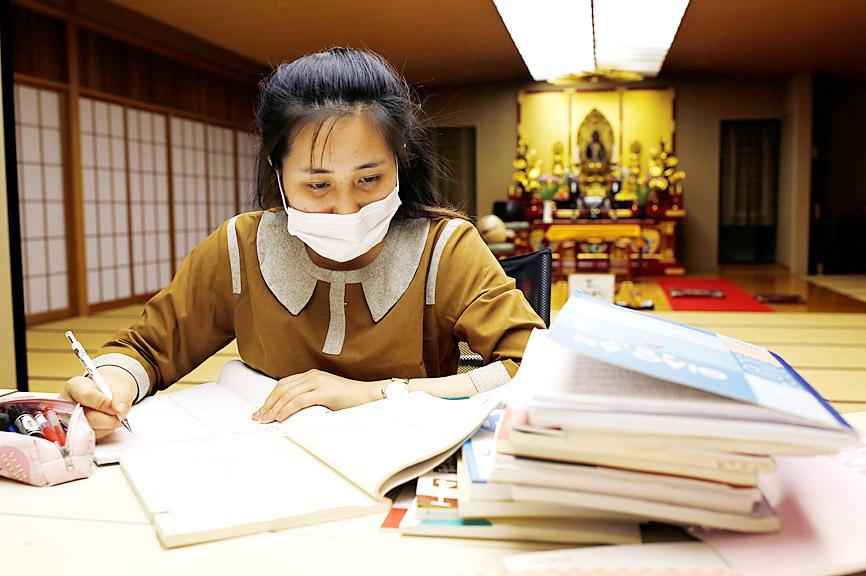A few hours after sundown last week, Thi Tu Luong dragged her suitcase down a side street in Tokyo’s business district, looking for the temple that would take her in for the night.
Luong, a 22-year-old Vietnamese worker, had just been fired from her job at a hotel in a hot springs town north of Tokyo.
After a few minutes of walking along the street, she saw Jiho Yoshimizu, who runs a support group for Vietnamese workers, waving her in from the entrance of a concrete building.

Photo: Reuters
The three-story Buddhist temple, Nisshinkutsu, has become a haven for Vietnamese migrant workers, one of the groups hardest-hit by the economic slump that has followed the COVID-19 outbreak in Japan.
“I felt abandoned,” Luong said shortly after she arrived. “I’m just really grateful that I can be here.”
Lured by higher wages, but often burdened by debt to recruiters, Vietnamese are the fastest-growing group of foreigners in Japan. They numbered 410,000 last year, up 24.5 percent from a year earlier.
Ordinarily, temple nuns would offer prayers for the deceased, but with the virus upending the economy, they are spending their time making care packages for Vietnamese across the country.
Inside the temple, young Vietnamese workers whose lives are in limbo study Japanese, cook Vietnamese food, and look for work or book flights home.
“We take care of people from when they’re inside the womb to when they’re inside an urn,” said Yoshimizu, head of the Japan-Vietnam Coexistence Support Group, a nonprofit based out of the temple.
The temple became known in Vietnamese circles after it took in Vietnamese workers left homeless after the 2011 earthquake and tsunami in northern Japan.
As its reputation spread, Yoshimizu began hearing from Vietnamese — including women seeking abortions, workers who were dismissed with nowhere to go and laborers fleeing abusive employers.
Yoshimizu, who last year handled about 400 cases, has since April been receiving between 10 and 20 messages a day from Vietnamese.
“No one else in Japan right now can provide this kind of support,” she said.
When Luong was fired without warning and told to leave her dorm, she turned to Yoshimizu.
“I have no job, no place to stay right now. Please, please help me,” Luong messaged Yoshimizu. “Can I come to the temple today?”
Luong graduated from a vocational school in March and started a job in mid-April at a high-end hotel in Nikko, but she was not given any work and spent her days in a dorm room with nothing to do.
Luong said she was paid about ¥30,000 (US$278.70) in May and was not sure if she was paid in June.
The hotel did not immediately respond to a request for comment.
Many Vietnamese workers arrive in Japan as students or trainees, making them dependent on their employers and vulnerable to abuse.
Yoshimizu spoke at the Japanese parliament last month to urge the government to do more to support Vietnamese students who do not have employment insurance.
“The government’s coronavirus policy is focused on helping Japanese first,” Yoshimizu said.

Chinese President Xi Jinping (習近平) is to visit Russia next month for a summit of the BRICS bloc of developing economies, Chinese Minister of Foreign Affairs Wang Yi (王毅) said on Thursday, a move that comes as Moscow and Beijing seek to counter the West’s global influence. Xi’s visit to Russia would be his second since the Kremlin sent troops into Ukraine in February 2022. China claims to take a neutral position in the conflict, but it has backed the Kremlin’s contentions that Russia’s action was provoked by the West, and it continues to supply key components needed by Moscow for

Japan scrambled fighter jets after Russian aircraft flew around the archipelago for the first time in five years, Tokyo said yesterday. From Thursday morning to afternoon, the Russian Tu-142 aircraft flew from the sea between Japan and South Korea toward the southern Okinawa region, the Japanese Ministry of Defense said in a statement. They then traveled north over the Pacific Ocean and finished their journey off the northern island of Hokkaido, it added. The planes did not enter Japanese airspace, but flew over an area subject to a territorial dispute between Japan and Russia, a ministry official said. “In response, we mobilized Air Self-Defense

CRITICISM: ‘One has to choose the lesser of two evils,’ Pope Francis said, as he criticized Trump’s anti-immigrant policies and Harris’ pro-choice position Pope Francis on Friday accused both former US president Donald Trump and US Vice President Kamala Harris of being “against life” as he returned to Rome from a 12-day tour of the Asia-Pacific region. The 87-year-old pontiff’s comments on the US presidential hopefuls came as he defied health concerns to connect with believers from the jungle of Papua New Guinea to the skyscrapers of Singapore. It was Francis’ longest trip in duration and distance since becoming head of the world’s nearly 1.4 billion Roman Catholics more than 11 years ago. Despite the marathon visit, he held a long and spirited

The pitch is a classic: A young celebrity with no climbing experience spends a year in hard training and scales Mount Everest, succeeding against some — if not all — odds. French YouTuber Ines Benazzouz, known as Inoxtag, brought the story to life with a two-hour-plus documentary about his year preparing for the ultimate challenge. The film, titled Kaizen, proved a smash hit on its release last weekend. Young fans queued around the block to get into a preview screening in Paris, with Inoxtag’s management on Monday saying the film had smashed the box office record for a special cinema